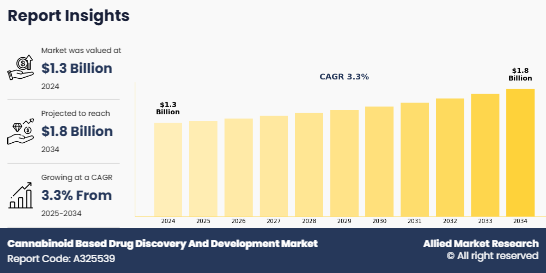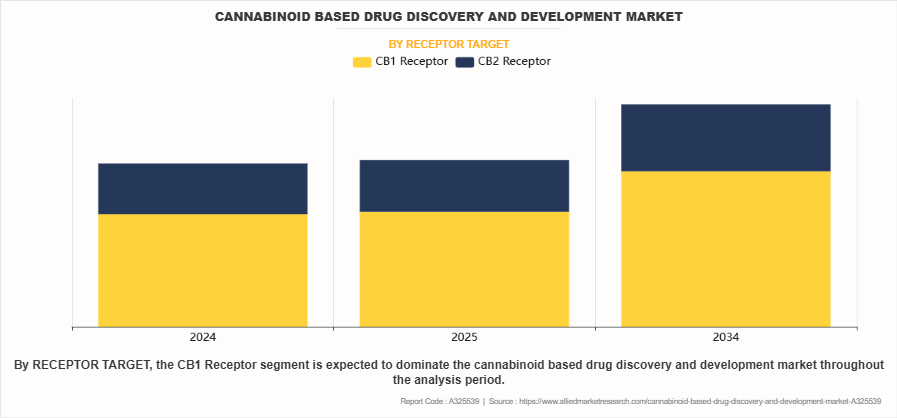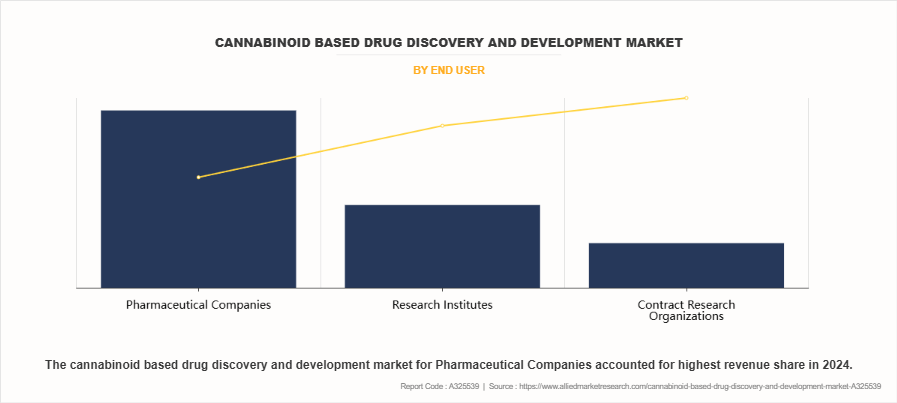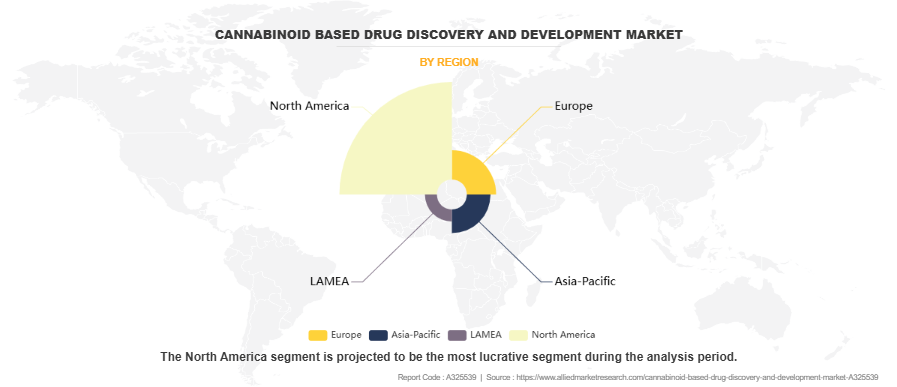Cannabinoid Based Drug Discovery And Development Market
P
2025
Cannabinoid Based Drug Discovery And Development Market Size, Share, Competitive Landscape and Trend Analysis Report, by Drug Development Stage, By Receptor Target, By End User : Global Opportunity Analysis and Industry Forecast, 2025-2034
Cannabinoid Based Drug Discovery And Development Market Research, 2034
The global cannabinoid based drug discovery and development market size was valued at $1.3 billion in 2024, and is projected to reach $1.8 billion by 2034, growing at a CAGR of 3.3% from 2025 to 2034. The growth of the cannabinoid based drug discovery and development market is driven by increasing research into the therapeutic potential of cannabinoids, rising prevalence of chronic diseases such as cancer, epilepsy, and multiple sclerosis, and growing regulatory approvals for cannabinoid based pharmaceuticals.
According to 2024 article by World Health Organization, epilepsy is a chronic noncommunicable disease of the brain that affects around 50 million people worldwide. Favorable government policies and initiatives supporting cannabinoid research and clinical trials have also contributed to market growth.

Key Takeaways
- By receptor target, the CB1 receptor segment was the highest contributor to the market in 2024.
- By end user, the pharmaceutical companies segment was the highest contributor to the market in 2024.
- By region, North America garnered the largest revenue share in 2024. However, Asia-Pacific is expected to grow at the fastest rate during the forecast period.
Cannabinoid based drug discovery and development focuses on harnessing compounds from cannabis, particularly cannabinoids like THC and CBD, to create therapeutic treatments. Research explores their potential in addressing various conditions, such as pain, inflammation, epilepsy, and anxiety. By targeting the endocannabinoid system, these drugs aim to modulate physiological processes. Despite challenges like regulatory hurdles and safety concerns, the growing interest in cannabinoids as a treatment option is driving innovation in pharmaceutical research and clinical trials.
Market Dynamics
The cannabinoid based drug discovery and development market growth is driven by increasing research into the therapeutic potential of cannabinoids for various medical conditions, including chronic pain, neurological disorders, and cancer. The rising prevalence of these diseases has led to greater demand for novel treatments, fostering investment in cannabinoid based drug development.
Growing research into the therapeutic potential of cannabinoids for various medical conditions is significantly driving the expansion of the cannabinoid based drug discovery and development market size. Studies continue to uncover the efficacy of cannabinoids in managing chronic pain, epilepsy, multiple sclerosis, and neurodegenerative disorders, leading to increased interest from pharmaceutical companies and research institutions. According to 2022 article by National Library of Medicine, over the past few years, medicinal cannabis has increasingly become a topic of conversation regarding its role in treating chronic pain.
The emergence of novel formulations and targeted delivery systems is a major driver for the cannabinoid based drug discovery and development market growth, enhancing therapeutic efficacy and patient compliance. Advanced formulations, such as nano emulsions, liposomal carriers, and solid lipid nanoparticles, improve the bioavailability of cannabinoids, addressing challenges related to poor water solubility and inconsistent absorption. Targeted delivery systems, including transdermal patches, inhalable formulations, and precision dosing via sublingual and mucosal routes, enable controlled and sustained drug release, minimizing psychoactive side effects while maximizing therapeutic benefits.
Advancements in drug delivery system facilitate the development of cannabinoid based drugs for various medical conditions, including chronic pain, epilepsy, and neurodegenerative disorders, driving increased research investment and regulatory approvals. As pharmaceutical companies leverage these innovative approaches, the market is witnessing a surge in product development.
According to cannabinoid based drug discovery and development market opportunity analysis, the increasing prevalence of chronic diseases such as cancer, multiple sclerosis, epilepsy, and neurodegenerative disorders is a key driver for the growth of the cannabinoid based drug discovery and development market. According to 2023 article by World Health Organization, it is estimated that over 1.8 million people have multiple sclerosis worldwide. As traditional treatment options often come with significant side effects or limited efficacy, there is growing interest in cannabinoids for their potential therapeutic benefits, including pain relief, anti-inflammatory properties, and neuroprotective effects.
The rising burden of chronic pain and mental health disorders, such as anxiety and depression, has further fueled demand for alternative treatment options, leading to increased research and development efforts in cannabinoid based pharmaceuticals.
In addition, increasing focus on scientific research is driving the growth of the cannabinoid based drug discovery and development market share. Advances in pharmacology and molecular biology have enabled researchers to explore the therapeutic potential of cannabinoids for various medical conditions, including chronic pain, epilepsy, multiple sclerosis, and neurodegenerative diseases. The identification of cannabinoid receptors (CB1 and CB2) and their role in modulating physiological processes has spurred interest in developing targeted therapies.
Clinical trials investigating the efficacy and safety of cannabinoid based treatments are expanding, supported by growing regulatory approvals and funding from pharmaceutical companies and research institutions. For instance, on January 21, 2025, InMed Pharmaceuticals Inc., announced positive results from a long-term in vivo preclinical Alzheimer’s Disease (‘AD’) study. In the study, INM-901 demonstrated a reduction in several plasma and brain markers of neuroinflammation, a recognized contributor to Alzheimer’s disease development and progression.
Additionally, the availability of advanced drug discovery platforms, such as AI-driven screening and high-throughput assays, is accelerating the identification of novel cannabinoid compounds with improved efficacy and reduced side effects. The increasing body of scientific evidence validating the medical benefits of cannabinoids is also influencing regulatory frameworks, encouraging further investment in cannabinoid research and fostering the development of innovative therapeutics.
Segmental Overview
The cannabinoid based drug discovery and development industry is segmented on the basis of drug development stage, receptor target, end user, and region. On the basis of drug development stage, the market is divided into preclinical studies, and clinical trials. Depending on receptor target, the market is divided into CB1 (Agonist, Antagonist, and Inverse Agonist), CB2 (Agonist, Antagonist, and Inverse Agonist), FAAH Inhibitor, MAGL Inhibitor, FAAH-MAGL Dual Inhibitor, and TRPV1 (Agonist and Antagonist). On the basis of end user, the market is segmented into pharmaceutical companies, research institutes, and contract research organizations.
Region wise, the market is analyzed across North America (U.S., Canada, and Mexico), Europe (Germany, France, UK, Italy, Spain, and Rest of Europe), Asia-Pacific (India, South Korea, Australia, and Rest of Asia-Pacific), and LAMEA (Brazil, Saudi Arabia, South Africa, and Rest of LAMEA).
By Receptor Target
On the basis of receptor target, CB1 receptor segment was the major revenue contributor in 2024. This is attributed to its critical role in the central nervous system. As the primary receptor for THC, the psychoactive compound in cannabis, CB1 has been extensively studied for its therapeutic potential in treating neurological disorders such as chronic pain, epilepsy, multiple sclerosis, and neurodegenerative diseases.

By End User
On the basis of end user, pharmaceutical companies segment dominated the market in 2024. This is attributed to their extensive research capabilities, regulatory expertise, and financial resources. Pharmaceutical companies are actively investing in the development of cannabinoid based therapeutics to address a range of medical conditions, including epilepsy, multiple sclerosis, chronic pain, and cancer-related symptoms.
The growing acceptance of cannabinoids in mainstream medicine, coupled with the increasing number of clinical trials evaluating their efficacy and safety, has further driven pharmaceutical companies to expand their cannabinoid-focused drug pipelines. However, research institutes segment is expected to register highest CAGR in forecasted period, owing to growing research on cannabinoids to explore its therapeutic benefits.

By Region
North America region dominated the cannabinoid based drug discovery and development market share in 2024 owing to strong regulatory support, a well-established pharmaceutical industry, and increasing investments in research and development. The region benefits from favorable regulatory frameworks, including the U.S. Food and Drug Administration (FDA) approvals for cannabinoid based drugs like Epidiolex and Dronabinol, which have set a precedent for further developments. Additionally, the presence of major pharmaceutical companies, biotechnology firms, and academic research institutions actively engaged in exploring cannabinoids for therapeutic applications drives market growth.
However, Asia-Pacific region is expected to register highest CAGR in the forecast period owing to increasing government initiatives, a rising prevalence of chronic diseases, and growing research and development (R&D) activities.

Competition Analysis
Competitive analysis and profiles of the major players in the cannabinoid based drug discovery and development market are Zyus Life Sciences, MAKScientific LLC, Inversago Pharma, Serina Therapeutics, Benuvia Operations, LLC, Neurotech International, IGC Pharma, Cardiol Therapeutics, Revive Therapeutics, Gynica, Argent BioPharma, Avicanna Inc, Artelo Biosciences, Botanix Pharmaceuticals, CNBX Pharmaceuticals Inc, Skye Bioscience, Sci Sparc, InMed Pharmaceuticals, Harmony Biosciences, Argent BioPharma, and Jazz Pharmaceutical Inc.
The key players have adopted clinical trials, acquisition, collaboration, new product development, patent, and agreement as the key strategies for expansion of their product portfolio.
Recent Developments in Cannabinoid Based Drug Discovery and Development Industry
- In August 2022, Jazz Pharmaceuticals plc announced top-line results from the Phase 3 open-label, single-arm trial in Japan evaluating the safety and efficacy of cannabidiol oral solution (marketed as Epidiolex/Epidyolex globally) as an adjunctive treatment for seizures associated with Lennox-Gastaut syndrome (LGS), Dravet syndrome (DS) or tuberous sclerosis complex (TSC).
- In May 2022, Jazz Pharmaceuticals announced the completion of its acquisition of GW Pharmaceuticals plc, a leader in the science, development and commercialization of cannabinoid based prescription medicines.
- In December 2023, Skye Bioscience, Inc announced that they have entered into an agreement under which Skye is providing Tautomer with an exclusive license to develop and commercialize Skye's proprietary THC prodrug, SBI-100, as a novel suppository application for chronic intractable pain and other indications ("Tautomer Products") in South Africa and the rest of Africa.
- In August 2023, Skye raised $17M in new capital and acquired Bird Rock Bio Inc. With Bird Rock's lead asset, nimacimab, Skye intends to advance two complementary but distinct Phase 2 first-in-class drug products targeting the cannabinoid 1 receptor, focusing initially on glaucoma and chronic kidney disease
Key Benefits for Stakeholders
- This report provides a quantitative analysis of the market segments, current trends, estimations, and dynamics of the cannabinoid based drug discovery and development market analysis from 2024 to 2034 to identify the prevailing cannabinoid based drug discovery and development market opportunities.
- The market research is offered along with information related to key drivers, restraints, and opportunities.
- Porter's five forces analysis highlights the potency of buyers and suppliers to enable stakeholders make profit-oriented business decisions and strengthen their supplier-buyer network.
- In-depth analysis of the cannabinoid based drug discovery and development market segmentation assists to determine the prevailing market opportunities.
- Major countries in each region are mapped according to their revenue contribution to the global market.
- Market player positioning facilitates benchmarking and provides a clear understanding of the present position of the market players.
- The report includes the analysis of the regional as well as global cannabinoid based drug discovery and development market trends, key players, market segments, application areas, and market growth strategies.
Cannabinoid Based Drug Discovery And Development Market Report Highlights
| Aspect | Details |
|---|---|
Market Size By 2034 | USD 1.8 billion |
Growth Rate | CAGR of 3.3% |
Forecast period | 2024 - 2034 |
Report Pages | 272 |
By End User |
|
By Receptor Target |
|
By Region |
|
Key Market Players | Skye Bioscience, Inc (Emerald Health Pharmaceutical), Pfizer (Arena Pharmaceuticals), Jazz Pharmaceuticals, Inc (GW Pharmaceuticals), CNBX, Harmony Biosciences (Zynerba Pharmaceuticals), Corbus Pharmaceuticals Holdings, Anebulo Pharmaceuticals, Therapix Biosciences Ltd., InMed Pharmaceuticals, Botanix Pharmaceuticals |
Related Tags
Cannabinoid Based Drug Discovery And Development Industry CB1 CB2 Neurological DisordersFrequently Asked Questions?
The total market value of Cannabinoid Based Drug Discovery and Development market is $1.3 billion in 2024.
The market value of Cannabinoid Based Drug Discovery and Development market in 2034 is $1.8 billion.
The forecast period for Cannabinoid Based Drug Discovery and Development market is 2025-2034
The base year is 2024 in Cannabinoid Based Drug Discovery and Development market
The CB1 segment is the most influencing segment in the cannabinoid based drug discovery and development market.

